Overview
The article delineates ten pivotal features of title production platforms that significantly enhance efficiency. These features include:
- Advanced automation
- Workflow automation
- Integrated document management
- Real-time collaboration tools
Collectively, they improve processing speeds, minimize human error, and facilitate superior organization and compliance. Consequently, professionals are empowered to concentrate on high-value tasks, thereby enhancing overall productivity in title research.
Introduction
Title production platforms are revolutionizing the real estate landscape, utilizing cutting-edge technology to improve efficiency and accuracy in title research. By examining essential features such as:
- Advanced automation
- Integrated document management
- Real-time collaboration tools
professionals can significantly streamline their workflows and reduce errors. However, as these platforms advance, organizations must consider how to maximize potential benefits while effectively navigating the complexities of compliance and data security.
Parse AI: Advanced Automation for Title Research
Parse AI harnesses advanced automation technologies to revolutionize the document examination process. By employing sophisticated machine learning algorithms, the platform adeptly analyzes extensive document collections, extracting pertinent information with remarkable speed and precision. This automation not only expedites the research process but also significantly reduces human error, enabling property assessment professionals to concentrate on more complex tasks that demand critical thinking and specialized knowledge, such as scrutinizing intricate legal documents or resolving disputes.
Consequently, organizations can anticipate enhanced processing speeds, with certain solutions achieving verification times as low as 14 minutes, alongside a reduction in manual error rates by up to 20%. Cost efficiencies are realized through automation, ensuring timely and accurate license verifications to meet service level agreements (SLAs). The integration of these advanced technologies, coupled with Parse AI's commitment to continual enhancement through collaboration with land service experts, bolsters operational efficiency and empowers researchers to adeptly navigate the complexities of real estate transactions.
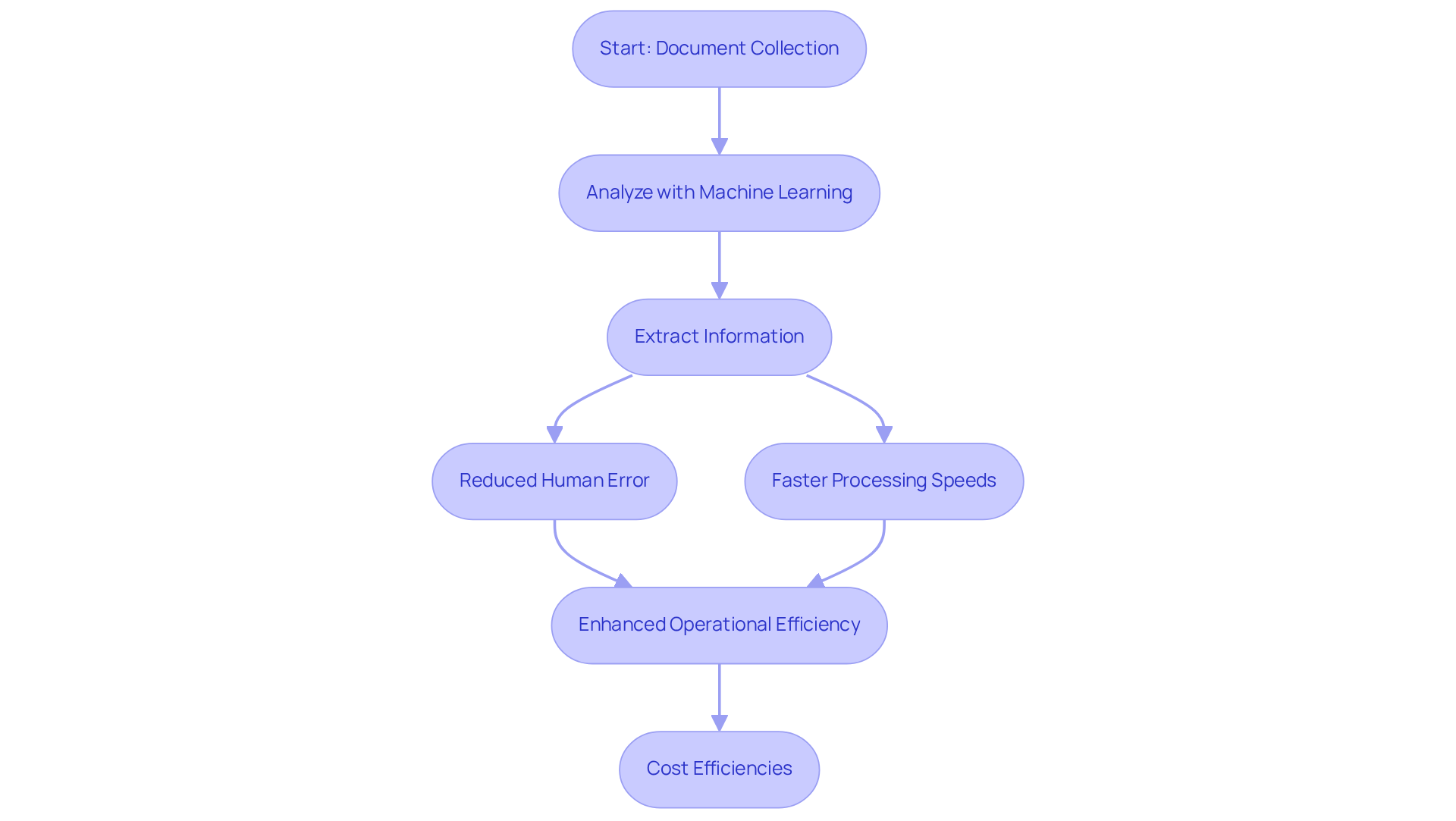
Optical Character Recognition: Enhancing Accuracy in Title Processing
Optical Character Recognition (OCR) stands as a revolutionary advancement in document processing, facilitating the transformation of scanned files into editable and searchable information. This technology significantly enhances accuracy by minimizing the risk of transcription errors that often accompany manual data entry. Furthermore, with OCR, document investigators can efficiently locate and verify information within extensive records, thereby ensuring that their reports are not only precise but also comprehensive.
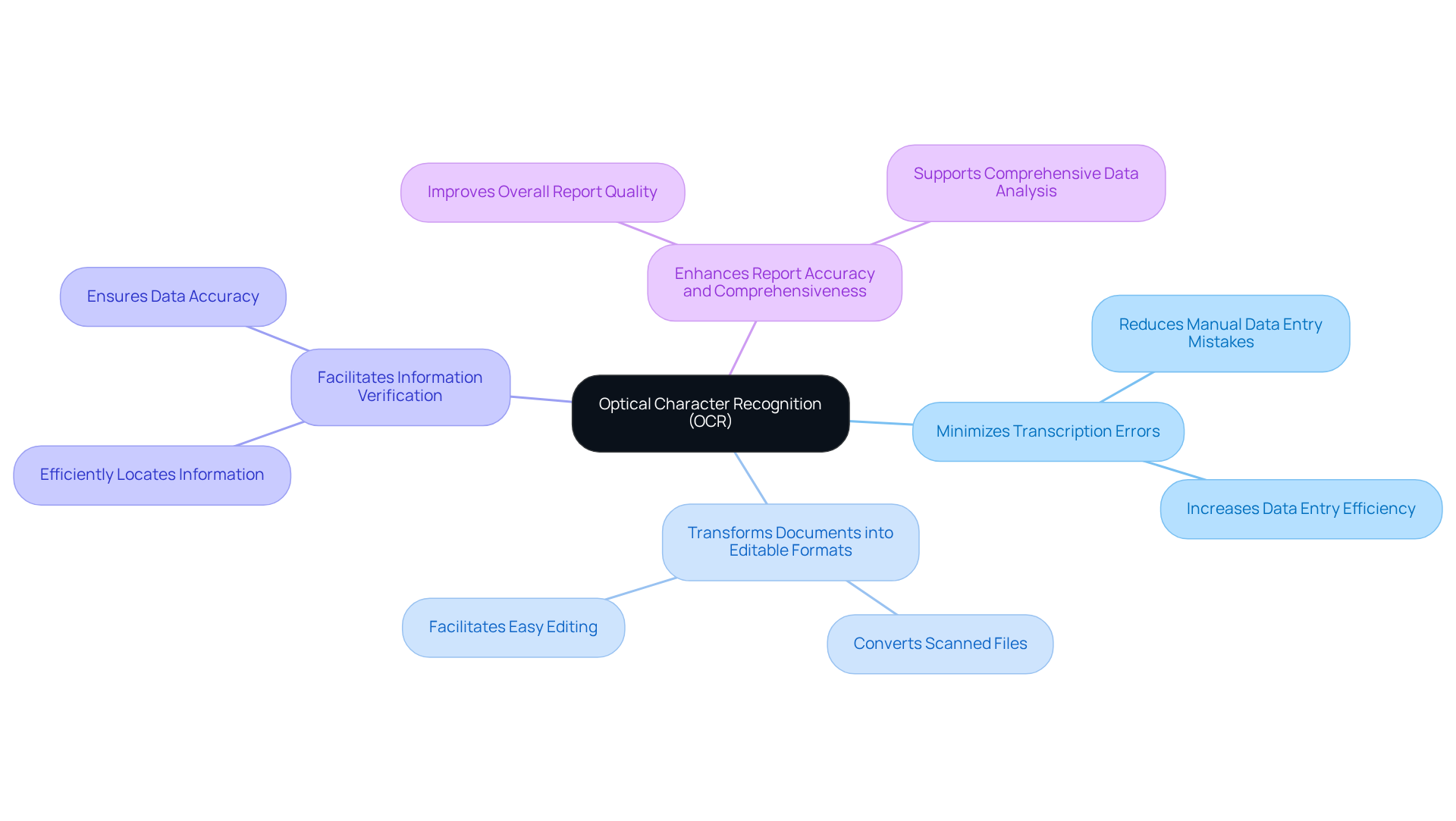
Workflow Automation: Streamlining Title Production Processes
Workflow automation tools integrated into document production platforms are revolutionizing the efficiency of document analysis. By automating repetitive tasks such as information entry and document routing, researchers can significantly reduce administrative workloads. This transformation allows them to allocate more time to critical analysis and informed decision-making, resulting in a substantial boost in overall productivity.
Firms that have adopted automation report a 67% faster hiring and onboarding process, showcasing the potential for similar efficiencies in research positions. Furthermore, automation has proven to enhance data accuracy by up to 88%, with 32% of companies noting a decrease in human error post-implementation. Consequently, specialists can focus on high-value tasks, ultimately improving both the quality of their work and the speed of report generation.
According to McKinsey, "86% of employees believe automation will help them do their work more efficiently," underscoring the transformative impact of these tools. Additionally, Parse AI utilizes machine learning and optical character recognition to optimize document investigation processes, yielding significant cost reductions and efficiency gains compared to traditional methods.
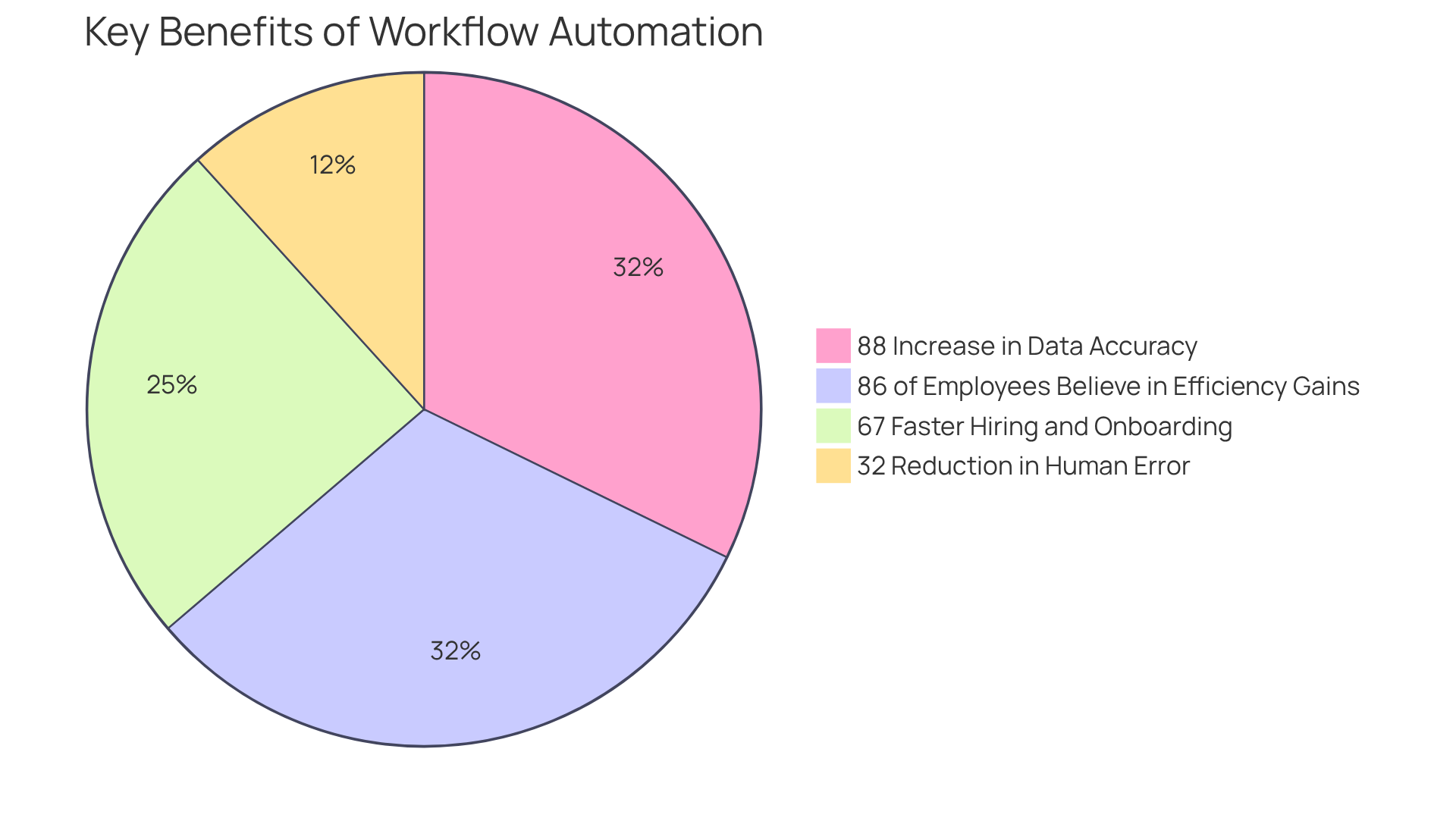
Integrated Document Management: Organizing Title Records Effectively
Integrated document management systems empower property examiners to systematically organize and store ownership records in a centralized location. This functionality facilitates swift access to documents, significantly reducing the time spent searching for essential information. Furthermore, with effective document management, scholars can quickly retrieve historical data, monitor changes, and maintain a clear audit trail. This capability is vital for ensuring compliance and accuracy in research, reinforcing the reliability of these solutions.
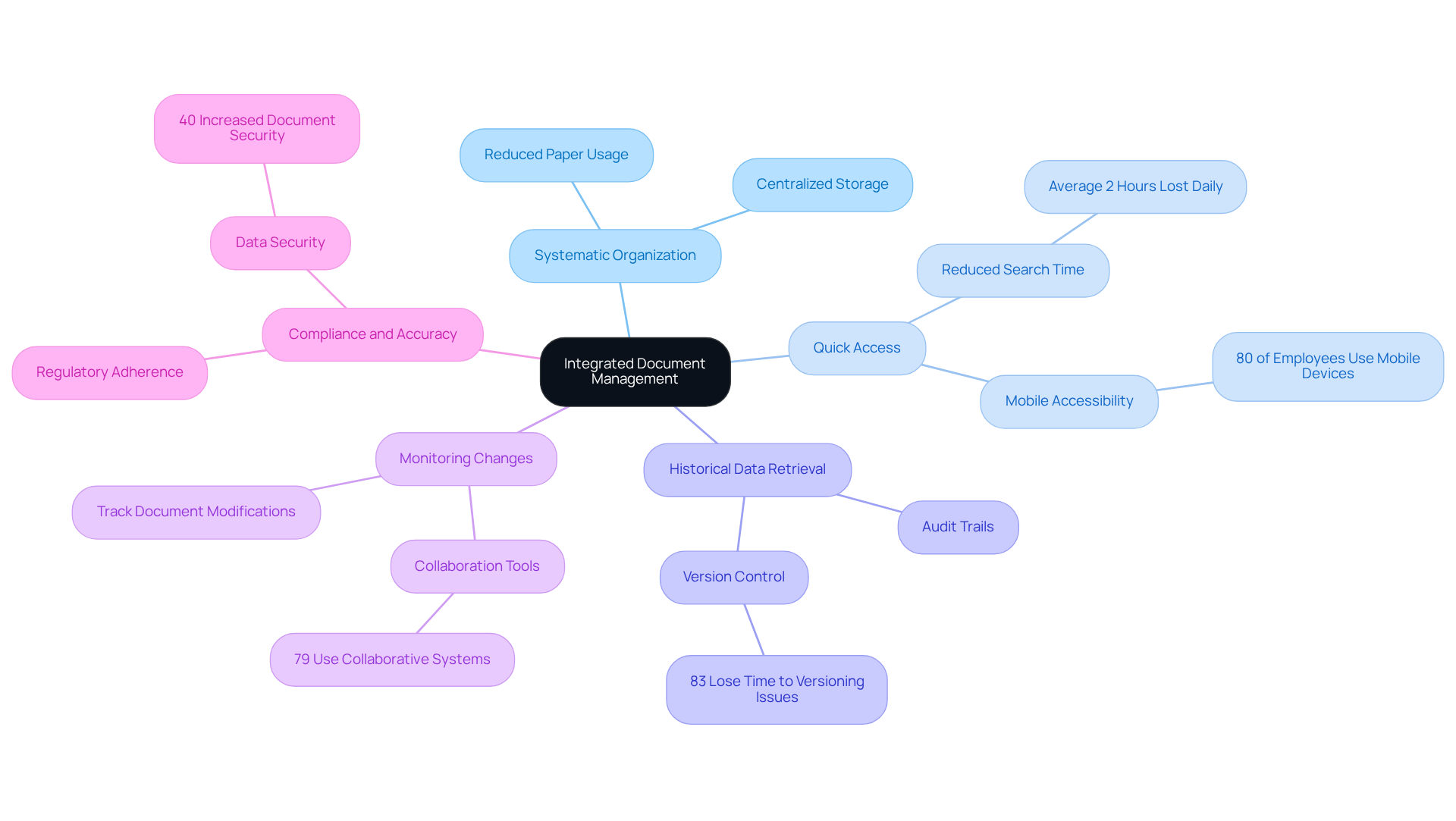
User-Friendly Interfaces: Enhancing Accessibility in Title Production
User-friendly interfaces are crucial for enabling document investigators to navigate the key features of title production platforms effectively. A well-designed interface not only minimizes the learning curve but also empowers users to swiftly access the tools and information they require. The overall user experience is significantly enhanced by key features of title production platforms, such as:
- Customizable dashboards
- Drag-and-drop functionality
- Clear navigation paths
Consequently, this leads to increased productivity and satisfaction among professionals in the field.
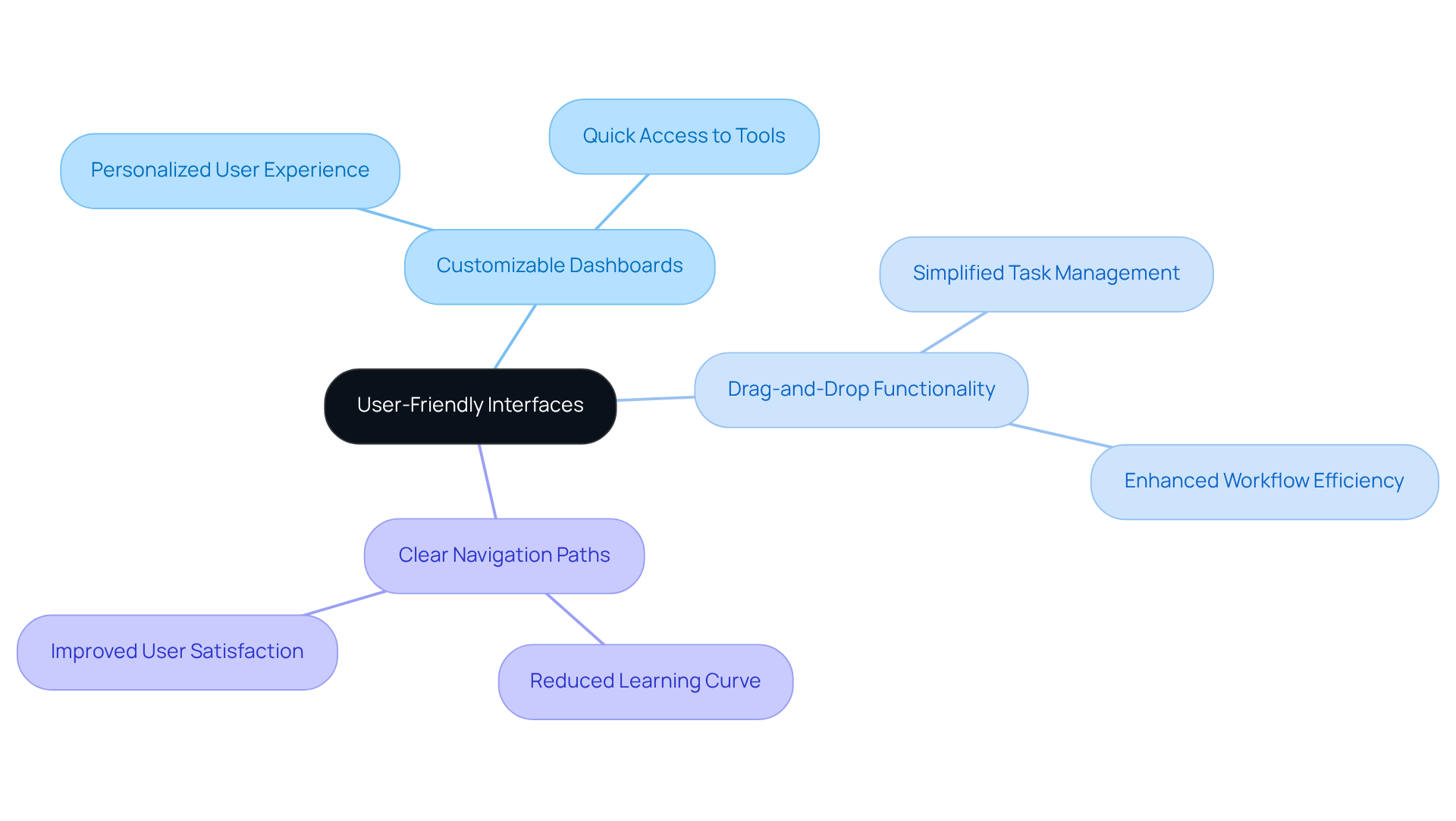
Real-Time Collaboration: Facilitating Teamwork in Title Research
Real-time collaboration tools are essential for project investigators, enabling seamless teamwork irrespective of location. Tools such as shared workspaces, instant messaging, and collaborative document editing enhance effective communication and facilitate swift decision-making. This cooperative environment mitigates the risks of miscommunication and significantly boosts the project process's effectiveness, as clear objectives and responsibilities prevent confusion in team contributions.
For instance, teams that utilize these tools often report increased creativity and problem-solving capabilities, as diverse perspectives unite to address challenges. As Michael Jordan aptly stated, 'Talent wins games, but teamwork and intelligence win championships,' highlighting the vital role of collaboration in achieving outstanding results. Furthermore, Ken Blanchard's insight that 'None of us is as smart as all of us' reinforces the importance of collective intelligence in teamwork.
In addition, regular check-ins ensure alignment and promptly address issues, fostering unity and maintaining motivation toward common objectives. Ultimately, the integration of collaborative tools not only streamlines workflows but also cultivates a culture of empowerment, transforming individual efforts into cohesive teamwork and leading to shared success among research professionals.
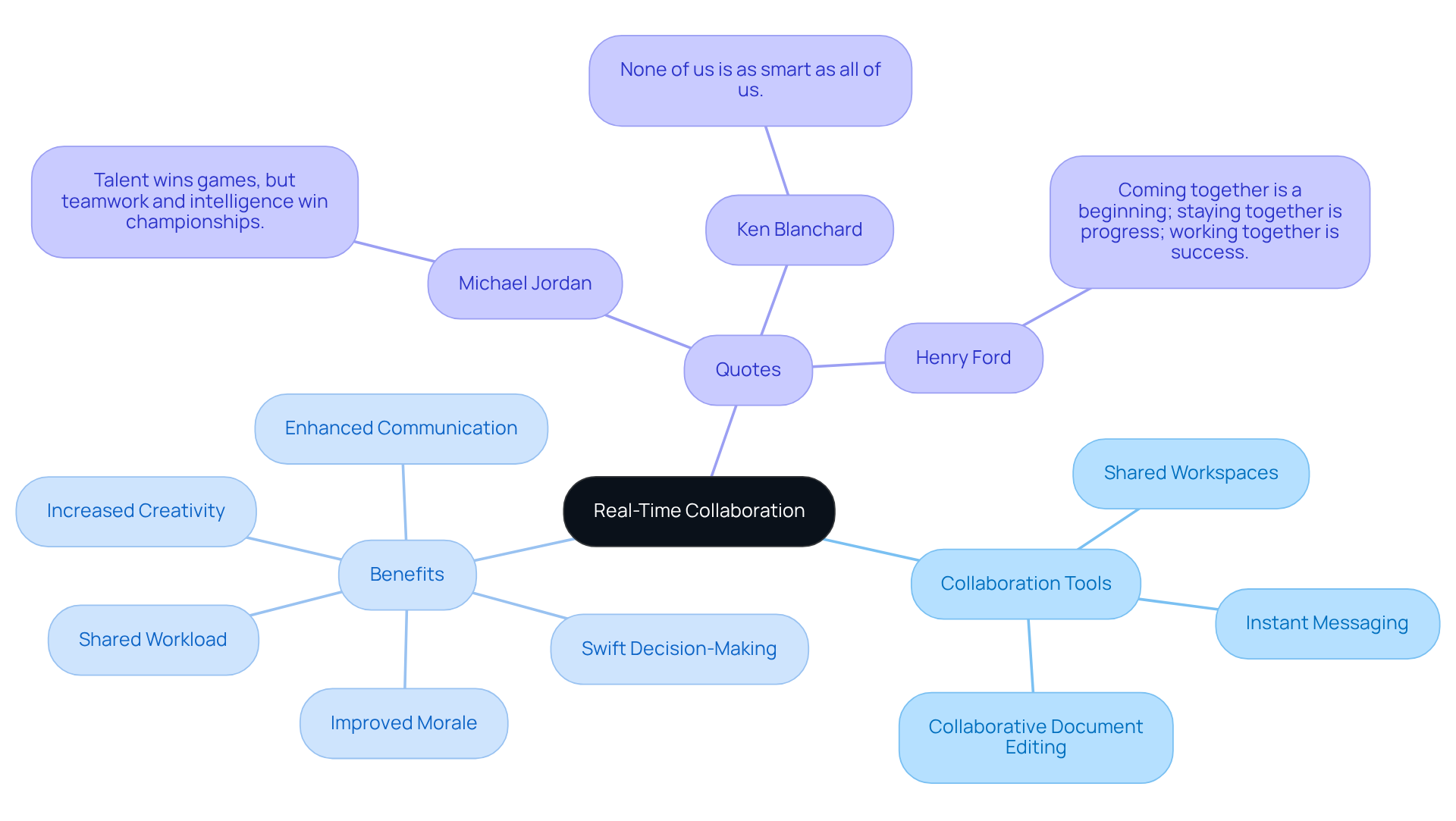
Compliance Tracking: Ensuring Legal Adherence in Title Production
Compliance monitoring functionalities within document production platforms are essential for ensuring that all legal obligations are met throughout the investigation process. By automating compliance checks and providing alerts for missing documentation or deadlines, these tools significantly mitigate the risk of non-compliance, which can result in costly penalties. Organizations that neglect compliance standards may incur fines ranging from $5,000 to $100,000 per month until the issues are resolved. Moreover, the average cost of a data breach for organizations with high non-compliance hovers around $5.05 million, underscoring the financial ramifications of oversight.
This proactive approach not only safeguards the integrity of research but also fosters trust with clients and stakeholders. Real-world examples illustrate that document researchers employing automated compliance checks have reported enhanced efficiency and accuracy in their workflows. For instance, organizations that extensively utilize AI and automation have noted $2.2 million lower data breach costs, emphasizing the tangible advantages of compliance automation. Furthermore, 87% of organizations indicate negative outcomes stemming from low compliance maturity or reactive compliance, reinforcing the necessity for robust compliance tracking.
Integrating the key features of title production platforms simplifies the research process while ensuring that legal compliance is maintained, ultimately bolstering the reliability and trustworthiness of the service for real estate professionals.
![]()
Customizable Reporting: Generating Tailored Insights in Title Research
Customizable reporting functionalities empower professionals to generate reports tailored to the specific needs of their clients and stakeholders. By selecting relevant data points, formatting styles, and visual elements, researchers can create reports that are not only informative but also visually compelling. This level of customization significantly enhances communication with clients, ensuring they receive insights in a clear and accessible format.
For example, tailored reports can feature specific property details, market trends, and visualizations that resonate with clients' interests, ultimately leading to heightened satisfaction. As noted by Anthony Hitt, 'To be successful in real estate, you must always and consistently put your clients’ best interests first.' This underscores the importance of effective communication through customized insights, fostering stronger relationships and trust—crucial elements in the competitive real estate landscape.
Furthermore, statistics indicate that clients have improved turn times by 50% with automated search and examination, illustrating the efficiency gained through customization. The ability to convey complex information in an easily understandable manner not only aids in decision-making but also enhances the significance of the research process.
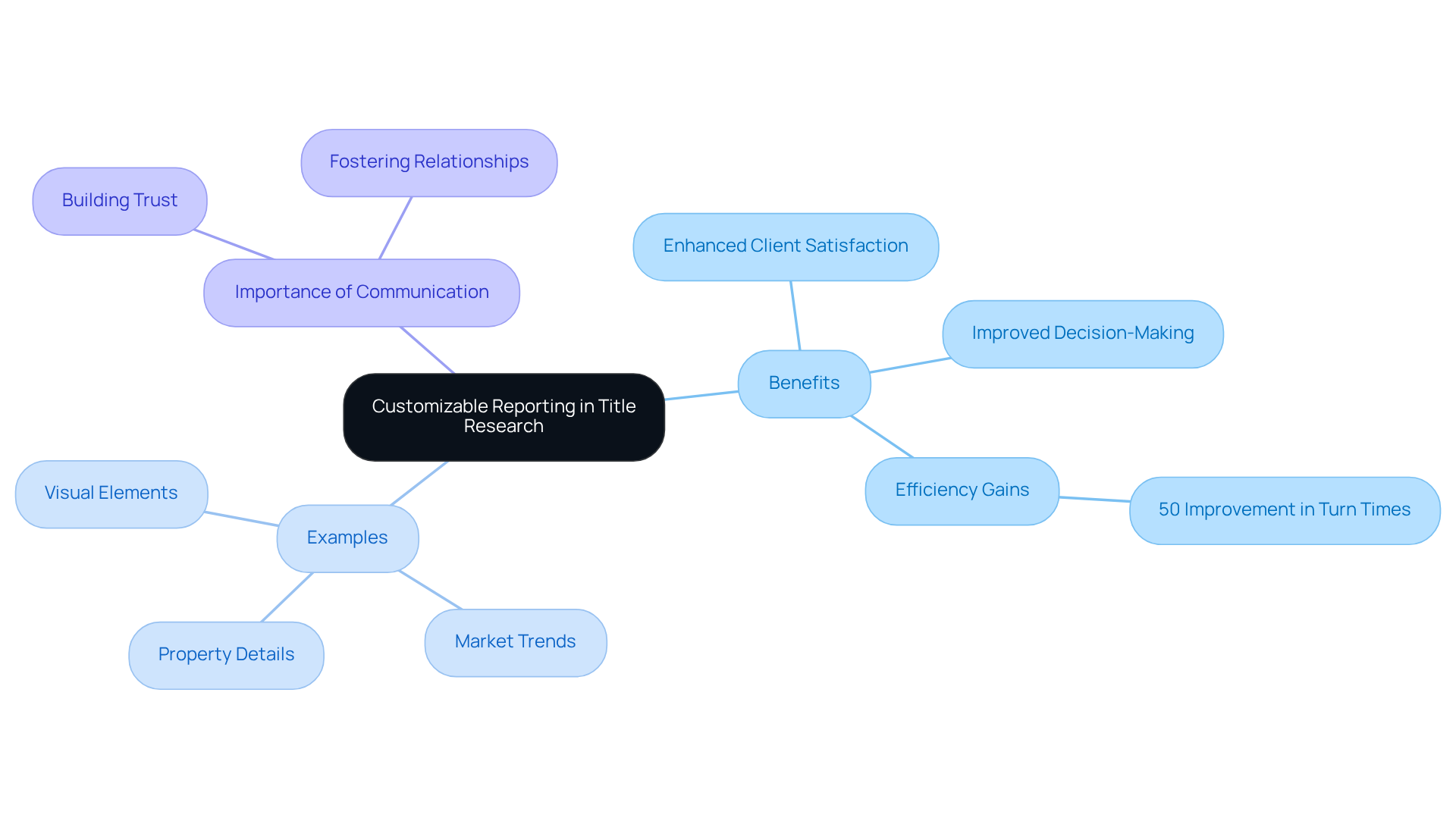
Data Security: Protecting Sensitive Title Information
Data security attributes are crucial for safeguarding sensitive information from unauthorized access and breaches. Comprehensive security measures, including encryption, access controls, and regular security audits, are key features of title production platforms that must be implemented. By prioritizing these practices, title researchers can protect client information, ensuring compliance with industry regulations and fostering trust and credibility in their services.
Organizations that adopt robust information protection strategies not only reduce risks but also enhance client trust, as evidenced by the notable increase in breaches linked to unpatched vulnerabilities. A proactive security strategy can prevent costly incidents; in fact, the average expense of a breach reached $4.88 million in 2024.
Real-world cases, such as the SolarWinds attack, underscore the necessity of rigorous security assessments to effectively manage third-party risks. Ultimately, a commitment to data security not only safeguards sensitive information but also strengthens the integrity of research operations.
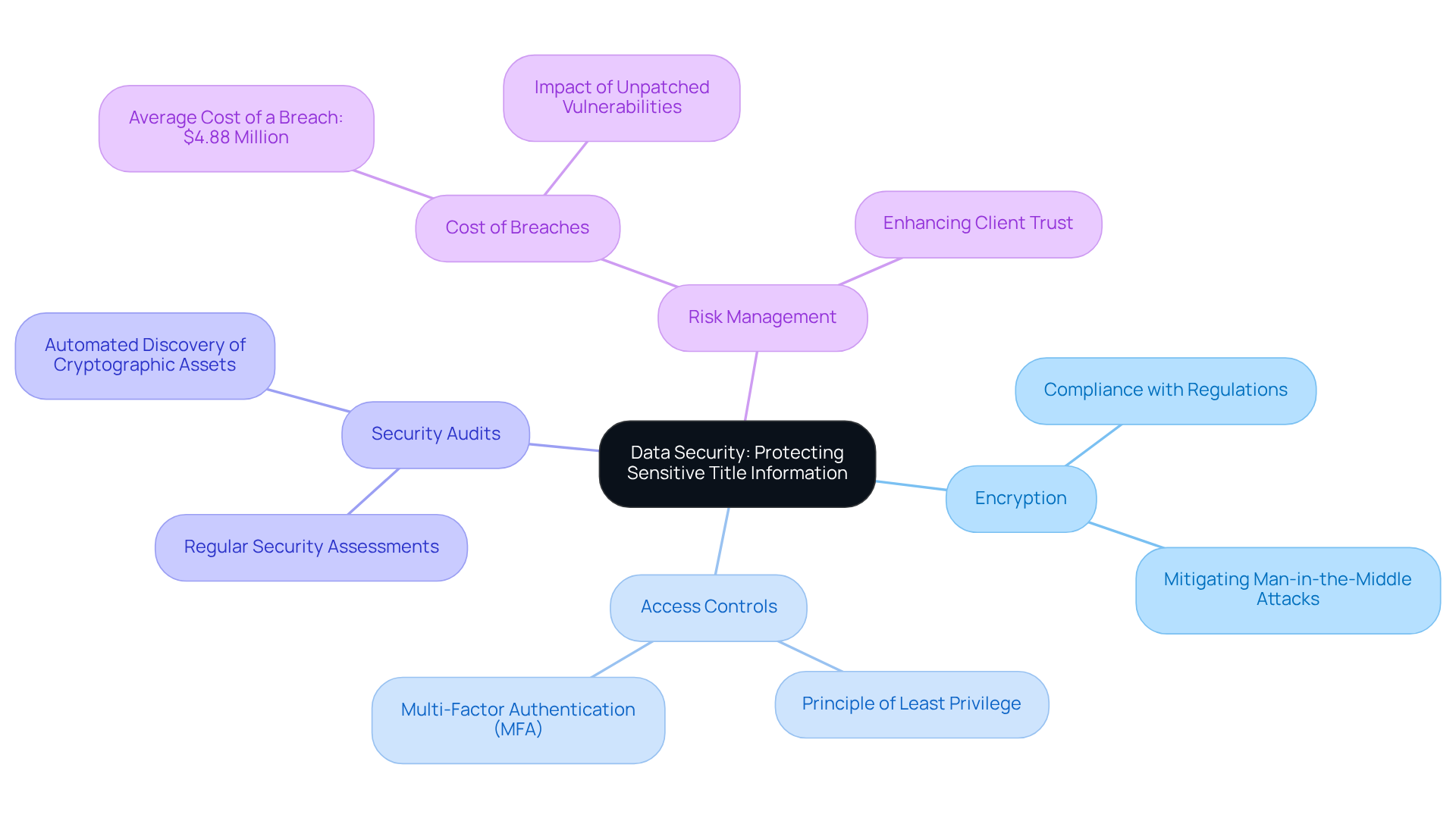
Analytics and Performance Metrics: Assessing Title Production Efficiency
Analytics and performance metrics play a critical role in evaluating the effectiveness of production processes. By meticulously tracking key performance indicators (KPIs), title researchers can pinpoint bottlenecks, assess turnaround times, and gauge the overall efficiency of their workflows. This data-driven methodology not only facilitates continuous improvement but also empowers teams to refine their processes, thereby enhancing productivity over time.
![]()
Conclusion
The evolution of title production platforms is defined by the integration of advanced technologies that significantly enhance efficiency, accuracy, and user experience. These platforms, distinguished by features such as automation, compliance tracking, and real-time collaboration, are indispensable for streamlining the title research process and addressing the demands of the modern real estate landscape.
Key elements highlighted throughout the article include:
- Parse AI's automation capabilities
- Optical character recognition for enhanced accuracy
- The critical role of user-friendly interfaces
The advantages of workflow automation, integrated document management, and customizable reporting further demonstrate how these tools empower professionals to concentrate on high-value tasks. This focus ultimately fosters better client relationships and improves operational efficiency. Furthermore, robust data security measures and performance analytics are essential for safeguarding sensitive information and refining processes.
In conclusion, adopting the features of title production platforms transcends merely keeping pace with technological advancements; it is about cultivating a culture of efficiency and collaboration within the industry. As the landscape continues to evolve, stakeholders must prioritize these innovations to enhance their operations, ensure compliance, and deliver exceptional service. By leveraging these tools, professionals can elevate their performance and contribute to the overall integrity and reliability of the title research process.
Frequently Asked Questions
What is Parse AI and how does it improve the document examination process?
Parse AI is a platform that utilizes advanced automation technologies and machine learning algorithms to analyze extensive document collections. It extracts relevant information quickly and accurately, reducing human error and allowing property assessment professionals to focus on more complex tasks.
What are the benefits of using Parse AI for property assessment professionals?
The benefits include enhanced processing speeds, with verification times as low as 14 minutes, a reduction in manual error rates by up to 20%, and cost efficiencies through timely and accurate license verifications.
How does Optical Character Recognition (OCR) enhance accuracy in title processing?
OCR converts scanned files into editable and searchable information, minimizing transcription errors associated with manual data entry. It allows document investigators to efficiently locate and verify information within extensive records, ensuring precise and comprehensive reports.
What role does workflow automation play in title production processes?
Workflow automation streamlines document analysis by automating repetitive tasks like information entry and document routing. This reduces administrative workloads, enabling researchers to focus on critical analysis and decision-making, which boosts overall productivity.
What improvements have firms experienced after adopting automation in their processes?
Firms report a 67% faster hiring and onboarding process, an 88% enhancement in data accuracy, and a 32% decrease in human error post-automation implementation. This allows specialists to concentrate on high-value tasks, improving work quality and report generation speed.
What percentage of employees believe automation will help them work more efficiently?
According to McKinsey, 86% of employees believe that automation will enhance their work efficiency.
How does Parse AI integrate with other technologies to improve document investigation?
Parse AI combines machine learning and optical character recognition to optimize document investigation processes, leading to significant cost reductions and efficiency gains compared to traditional methods.




